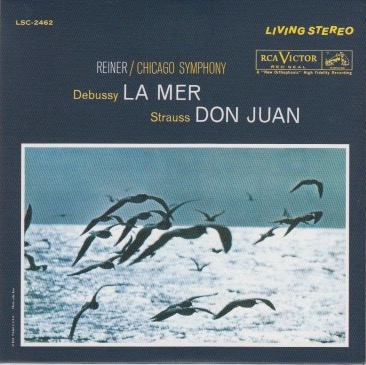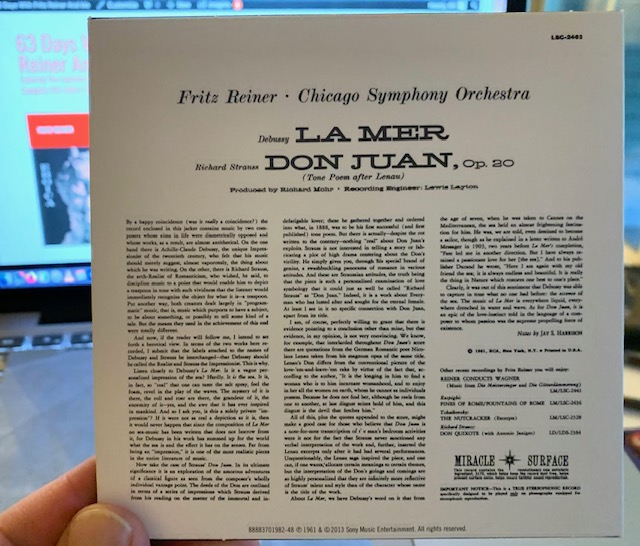
There’s a magical quality to today’s album, a certain dreamlike bouquet.
And it begins with Claude Debussy’s La Mer (the sea), which is “A Tone Poem after Lenau,” whatever that means.
The Objective Stuff
From his entry on Wikipedia,
(Achille) Claude Debussy (1862 – 25 March 1918) was a French composer. He is sometimes seen as the first Impressionist composer, although he vigorously rejected the term. He was among the most influential composers of the late 19th and early 20th centuries.
Born to a family of modest means and little cultural involvement, Debussy showed enough musical talent to be admitted at the age of ten to France’s leading music college, the Conservatoire de Paris. He originally studied the piano, but found his vocation in innovative composition, despite the disapproval of the Conservatoire’s conservative professors. He took many years to develop his mature style, and was nearly 40 when he achieved international fame in 1902 with the only opera he completed, Pelléas et Mélisande.
Debussy’s orchestral works include Prélude à l’après-midi d’un faune (1894), Nocturnes (1897–1899) and Images (1905–1912). His music was to a considerable extent a reaction against Wagner and the German musical tradition. He regarded the classical symphony as obsolete and sought an alternative in his “symphonic sketches”, La mer (1903–1905). His piano works include two books of Préludes and one of Études. Throughout his career he wrote mélodies based on a wide variety of poetry, including his own. He was greatly influenced by the Symbolist poetic movement of the later 19th century. A small number of works, including the early La Damoiselle élue and the late Le Martyre de saint Sébastien have important parts for chorus. In his final years, he focused on chamber music, completing three of six planned sonatas for different combinations of instruments.
With early influences including Russian and Far Eastern music, Debussy developed his own style of harmony and orchestral colouring, derided – and unsuccessfully resisted – by much of the musical establishment of the day. His works have strongly influenced a wide range of composers including Béla Bartók, Olivier Messiaen, George Benjamin, and the jazz pianist and composer Bill Evans. Debussy died from cancer at his home in Paris at the age of 55 after a composing career of a little more than 30 years.
From its entry on Wikipedia,
La mer, trois esquisses symphoniques pour orchestre (French for The sea, three symphonic sketches for orchestra), or simply La mer (The Sea), L. 109, CD. 111, is an orchestral composition by the French composer Claude Debussy.
Composed between 1903 and 1905, the piece was premiered in Paris in October 1905. It was initially not well received. Even some who had been strong supporters of Debussy’s work were unenthusiastic, even though La mer presented three key aspects of Debussy’s aesthetic: Impressionism, Symbolism and Japonism. But the work was performed in the US in 1907 and Britain in 1908; after its second performance in Paris, in 1908, it quickly became one of Debussy’s most admired and frequently performed orchestral works.
The first audio recording of the work was made in 1928. Since then, orchestras and conductors from around the world have set it down in many studio or live concert recordings.
This performance was recorded on February 27, 1960, in Orchestra Hall, Chicago. Maestro Reiner was in his 72nd year of life. Debussy composed it when he was 42-43 years of age.
From his entry on Wikipedia,
Richard Georg Strauss (1864-1949) was a German composer, conductor, pianist, and violinist. Considered a leading composer of the late Romantic and early modern eras, he has been described as a successor of Richard Wagner and Franz Liszt. Along with Gustav Mahler, he represents the late flowering of German Romanticism, in which pioneering subtleties of orchestration are combined with an advanced harmonic style.
Strauss’s compositional output began in 1870 when he was just six years old and lasted until his death nearly eighty years later.
From its entry on Wikipedia,
Don Juan, Op. 20, is a tone poem in E major for large orchestra written by the German composer Richard Strauss in 1888. The work is based on Don Juans Ende, a play derived from an unfinished 1844 retelling of the tale by poet Nikolaus Lenau after the Don Juan legend which originated in Renaissance-era Spain. Strauss reprinted three excerpts from the play in his score. In Lenau’s rendering, Don Juan’s promiscuity springs from his determination to find the ideal woman. Despairing of ever finding her, he ultimately surrenders to melancholy and wills his own death. It is singled out by Carl Dahlhaus as a “musical symbol of fin-de-siècle modernism”, particularly for the “breakaway mood” of its opening bars.
The premiere of Don Juan took place on 11 November 1889 in Weimar, where Strauss, then twenty-five, served as Court Kapellmeister; he conducted the orchestra of the Weimar Opera. The work, composed when Strauss was only twenty-four years old, became an international success and established his reputation as an important exponent of modernism. Strauss often conducted the work in concerts during his long career, and the piece was part of the first recordings that he made in 1917. The last time he conducted the work was in 1947 with the BBC Symphony Orchestra during his last tour outside of Germany.
Although Don Juan was an undeniable triumph for Strauss, the work was not without its critics. Cosima Wagner, who was normally a supporter of Strauss and his music, despised the work because of its subject matter which did not rise to the metaphysical ideals of Wagner. The New Grove Dictionary of Music and Musicians states that “The aesthetics of Wagner and Liszt may have inspired him to embrace the extra-musical, but he refused to carry their torch for music as a sacred entity; the libertine Don (and Strauss with him) simply thumbs his nose at the world.”
Performances of the work last around eighteen minutes. Excerpts from Don Juan are staples of professional orchestral auditions due to the numerous technical and musical demands on each instrument.
Don Juan was composed in 1888, the year Fritz Reiner was born. Strauss was 24. This performance (the second time I’ve heard Strauss’ Don Juan in this box set, the first time being Day 4) was recorded on February 6, 1960 in Orchestra Hall, Chicago.
The Subjective Stuff
Recording quality: 4 (both)
Overall musicianship: 5 (both)
CD book notes: 2
CD “album cover” information: 3
How does this make me feel: 4 (La Mer) / 3.5 (Don Juan)

Of these two performances, I enjoyed Debussy’s La Mer the most. It was dreamlike and engrossing, moody and atmospheric.
Strauss’ Don Juan was sufficiently heroic and brash (sort of like the soundtrack to the Errol Flynn movie The Adventures of Robin Hood). But it wasn’t as engaging a piece of music. I wasn’t drawn in the way I was with Debussy’s composition.
Both were excellent.
But, ultimately, I’d probably only hear Debussy’s La Mer again, if I listened to this album again at all.
